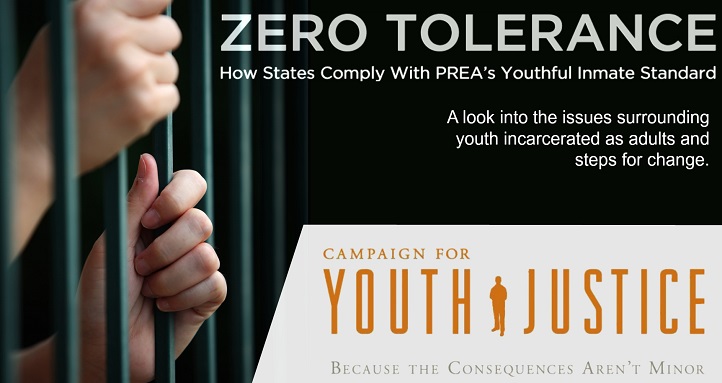Zero Tolerance: How States Comply with PREA's Youthful Inmate Standard

CFYJ released a new report today, Zero Tolerance: How States Comply with PREA’s Youthful Inmate Standard. This report explores how states house youth under 18 in prisons in the new age of PREA compliance and enforcement. Furthermore, this report highlights national trends in juvenile arrests, crimes, and incarceration of children in the adult system.
The United States’ extraordinary use of adult correctional facilities to house youth presents numerous concerns, including serious, long-term costs to the youth offender and to society at large. Science and research conducted over the last 20 years confirm what common sense tells us: kids are different. Adolescent development and adolescent brain research have prompted leaders across the country to start looking at our juvenile justice system through a developmentally appropriate lens.1 Such a perspective equally applies to the treatment of youth who would be eligible for adult prison sentences. In light of the decline of youth arrests and youth crime, coupled with the requirements of the Prison Rape Elimination Act (PREA) the housing status of the 1200 youth under 18 years of age in the adult prison must be investigated. Each state has its own unique prison system, so in order to determine the housing status of youth we gathered information on each state’s statutes, policies, and practices for housing the shrinking — and at times — invisible, population of youth in adult prisons across the country.
Despite the strong language provided in the Prison Rape Elimination Act, state laws vary widely as to the regulations and parameters for housing youth in adult prisons. In fact, some states have no regulations or parameters governing the treatment of youth sentenced as adults at all. While some states have fully removed youth from their prison systems — Hawaii, West Virginia, Maine, California, and Washington — the overwhelming majority of states allow youth to be housed in adult prisons. In fact 37 states housed youth under 18 years of age in their state prisons in 2012. The PREA requirements have become the emerging standard of care for the housing of youth in adult facilities, yet the majority of states still permit the housing of youth in adult facilities, often times with no special housing protections. Once youth are sentenced in adult court to an adult prison term, few jurisdictions have enacted safeguards to protect their physical, mental and emotional health. Additionally, programs and behavioral responses in adult facilities rarely are adjusted to meet the needs of adolescent populations.
Link To Full Report
Link To Executive Summary
Also please help us spewad the word on social media:
Twitter:
- CFYJ’s latest report explores how states house youth in prisons in the new age of PREA compliance and enforcement http://bit.ly/1MX7BHF
- CFYJ launches a new report: “Zero Tolerance: How States Comply with PREA’s Youthful Inmate Standard” http://bit.ly/1MX7BHF
- Despite PREA regulations, the majority of states still permit the housing of youth in adult facilities, highlights CFYJ’s new report http://bit.ly/1MX7BHF
- According to CFYJ’s latest report, the number of youth incarcerated in the adult prison system has decreased 70% since 2000 http://bit.ly/1MX7BHF
- CFYJ’s new report finds that youth of color are placed in adult facilities at much higher rates than their white peers http://bit.ly/1MX7BHF
- Youth housed in adult prisons face higher risks for sexual abuse, physical force or threat of force, says CFYJ’s latest report http://bit.ly/1MX7BHF
- CFYJ’s new report once again exposes the consequences of sending youth to adult prison: recidivism, abuse and suicide http://bit.ly/1MX7BHF
- Florida is the state with the highest population of juveniles in prison, according to CFYJ’s latest report http://bit.ly/1MX7BHF
- Youth in adult prisons recidivate 34% more often than youth in the juvenile system, reminds CFYJ’s new report http://bit.ly/1MX7BHF
- CFYJ’s latest report once again shows that youth in the adult system commit suicide at greater rates http://bit.ly/1MX7BHF
Facebook:
- CFYJ just released a brand new report, “Zero Tolerance: How States Comply with PREA’s Youthful Inmate Standard”, which explores how states house youth under 18 in prisons in the new age of PREA compliance and enforcement. The report highlights that despite the official implementation of PREA, the majority of states still permit the housing of youth in adult facilities and/or refuse to comply. Youth housed in adult prison face greater risk of physical abuse and suicide than youth in juvenile facilities. http://bit.ly/1MX7BHF
- CFYJ’s latest report, “Zero Tolerance: How States Comply with PREA’s Youthful Inmate Standard”, once again shows the disastrous consequences of incarcerating youth in adult facilities. Youth in adult prisons recidivate 34% more often than youth in the juvenile system. Youth of color are the first targets of this system and are much more likely to be placed in adult facilities than their white peers. http://bit.ly/1MX7BHF

